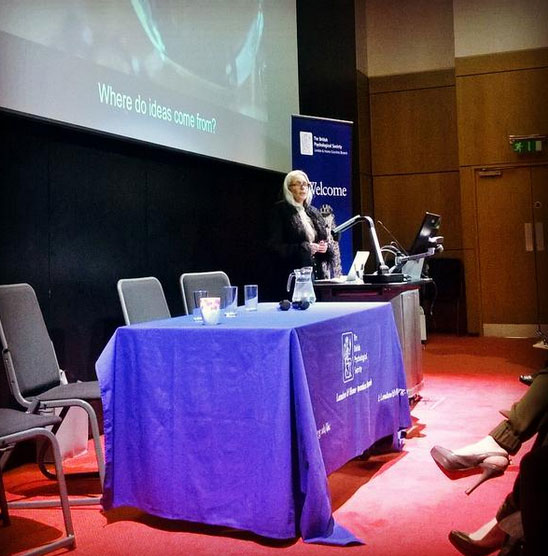The second of LCF’s Better Lives seminars on Positive Psychology in Fashion saw Professor Helen Storey MBE and Dr. Linda Papadopoulos discussing the ways in which they, as professionals, aim to support others to thrive.
After apologising for “being a bit Yorkshire” and keeping her coat on, Helen Storey went into detail about the success of her pioneering Catalytic Clothing project, before giving the audience an exclusive look at her future work.
For Helen, one of the key antidotes to discussing issues that people don’t want to discuss is by using the notion of beauty. The fully booked audience was swept away by the beauty of Helen’s dress, which aims to purify the air we breathe. From the light to dark ombré of the fabric to the pattern mimicking the passageway of the lungs, the dress is a true vision.
Often the issues surrounding climate change are a challenge: how do we make people care? Helen argues that we need to “capture and share the human ingenuity it takes to combat climate change.” After vividly mapping out the immense social response to the Catalytic Clothing project, it appears that Helen is achieving just that.
Achieving (and sometimes non-achieving) was a profound interest of yesterday evening’s second speaker, Dr. Linda Papadopoulos. Linda’s cousin has vitiligo, a condition that affects the pigmentation of the skin, which altered her ability to thrive and achieve. “She became withdrawn; she dropped out of gymnastics,” Linda explained.
Interviewed by MSc Applied Psychology in Fashion student Elena Mansilla, Linda spoke passionately about the pressures placed upon women to have it all.
“Your value lies in your youth and beauty,” Linda problematised, before explaining how the likes of Instagram and Facebook have brought new meaning to the concept of body image: “We’re defining our identity based on people who don’t know us, who don’t care.”
For Linda and Helen, the means to thriving is all about regaining control over your own mind and body. When questioned by one audience member about our tendency to be our own worst enemy, Linda noted:
“Defining a problem is fine but defining a solution is better.”
Helen added: “Without obstruction, there is no growth.”
After picking up a signed copy of Linda’s new book, and allowing the topics touched upon in the seminar to sink in, I left feeling empowered and refreshed. What’s to say that every single person in the audience couldn’t thrive?
Words by Nicole Mullen, BA (Hons) Fashion Journalism

